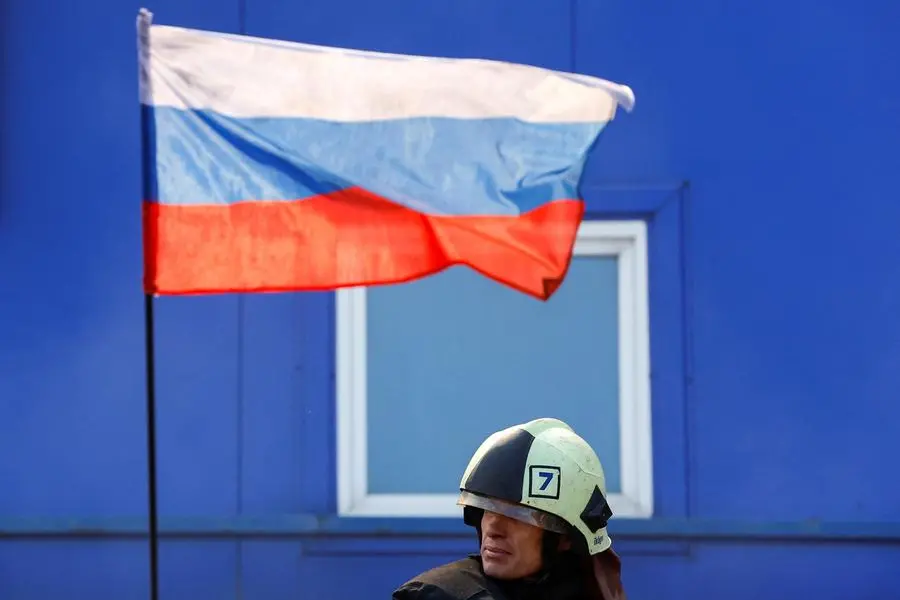PHOTO
Russia's defence ministry on Wednesday blamed mobile phone use by its soldiers for a deadly Ukrainian missile strike that it said killed 89 servicemen, raising the reported death toll from 63.
The New Year's Eve strike, the deadliest single incident Moscow has acknowledged since the start of the war, has angered pro-war Russian commentators, increasingly vocal about what they see as a half-hearted and incompetent campaign in Ukraine.
Criticism has been directed at military commanders rather than Russian President Vladimir Putin, who has not commented publicly on the attack, which has dealt a further blow after major battlefield retreats in recent months.
The Russian defence ministry said four Ukrainian rockets had hit a temporary Russian barracks in a vocational college in Makiivka, twin city of the Russian-occupied regional capital of Donetsk in eastern Ukraine.
Although a probe has been launched, the Russian ministry said the main reason for the attack was the mass use of mobile phones by servicemen, which it described as illegal.
"This factor allowed the enemy to track and determine the coordinates of the soldiers' location for a missile strike," it said in a statement issued just after 1 a.m. (2200 GMT Tuesday) on Wednesday.
Russia has effectively shut down all direct opposition to the war, with open criticism banned by severe media rules. But it has given comparatively free rein to pro-war nationalist bloggers, many with hundreds of thousands of followers on social media.
Semyon Pegov, a war correspondent awarded the Order of Courage by Putin, said on Telegram that pointing the finger at troops using mobile phones "looks like an outright attempt to smear the blame". There were other ways Ukraine could have spotted the base, he said.
Pegov said the death toll would rise further: "The announced data is most likely for those who were immediately identified. The list of the missing, unfortunately, is noticeably longer."
Ukrainian President Volodymyr Zelenskiy, who rarely comments on specific Ukrainian military strikes, made no mention of the attack in a video address on Tuesday.
Ukraine initially said hundreds of Russians were killed in Makiivka. It has since avoided giving details.
'MAJOR RUSSIAN OFFENSIVE'
Zelenskiy said Russia was set to launch a major offensive.
"We have no doubt that current masters of Russia will throw everything they have left and everyone they can round up to try to turn the tide of the war and at least delay their defeat," Zelenskiy said in a video address.
"We have to disrupt this Russian scenario. We are preparing for this. The terrorists must lose. Any attempt at their new offensive must fail," he continued.
With Russia losing territory in the second half of 2022, Putin ordered the first call-up of reservists since World War Two. Kyiv has been saying for weeks that Russia plans to order another mass conscription drive and shut its borders to prevent men from escaping the draft.
In the latest sign that the Kremlin may be considering such a move, a little known group claiming to represent widows of Russian soldiers released a call for Putin to order a large-scale mobilisation of millions of men.
The General Staff of Ukraine’s Armed Forces on Wednesday said Russia had launched seven missile strikes, 18 air strikes and more than 85 attacks from multiple-launch rocket systems in the past 24 hours on civilian infrastructure in three cities, Kramatorsk, Zaporizhzhia and Kherson.
"There are casualties among the civilian population," it said. Russia denies targeting civilians.
The battlefield reports could not be independently verified by Reuters.
Ukraine's General Staff also said Russian forces continued to concentrate on advancing in the area of Bakhmut, a city in Donetsk now largely reduced to ruins after months of fighting, while also trying to improve their positions elsewhere along the front line in that region.
Mikhail Razvozhayev, the Russian-installed governor of Sevastopol in Crimea, said on Wednesday on the Telegram messaging app that air defence systems had shot down two drones near the Belbek military airfield.
Putin plans to talk to Turkish President Tayyip Erdogan on Wednesday, Kremlin spokesman Dmitry Peskov told Interfax, the latest in a series of conversations the two leaders have had since the start of the war.
Turkey acted as mediator alongside the United Nations to establish a deal allowing grain exports from Ukrainian ports. But the chances of serious peace talks appear remote, with Moscow demanding Kyiv accept its annexation of seized land and Ukraine vowing to drive Russian troops from all its territory.
Putin launched what he calls a "special military operation" in Ukraine on Feb. 24, citing threats to Russian security and a need to protect Russian speakers. Ukraine and its allies accuse Moscow of an unprovoked imperialist-style grab for territory.
(Reporting by Reuters bureaux; Writing by Michael Perry and Gareth Jones; Editing by Simon Cameron-Moore and Peter Graff)





















